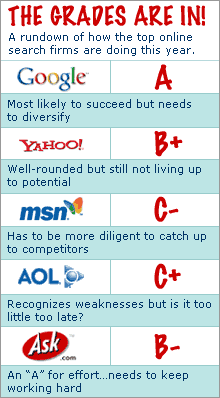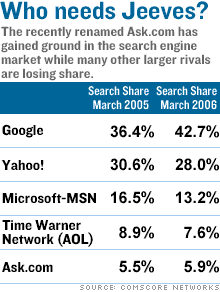|
The Internet wars: A report card
We rate the financial performance of the top Internet sites. See how Google, Yahoo!, MSN and AOL did.
NEW YORK (CNNMoney.com) - The battle for Internet users is escalating. Microsoft finally unveiled its new adCenter service on Thursday, and scrapped Yahoo's technology in the process. Meanwhile, Yahoo! has been busy updating its own offerings and search engine leader Google is still spending like mad on new products.
All the while, these three need to fend off growing competition from AOL, owned by Time Warner, and Ask.com. Now that the parent companies of these five big sites have released earnings, here's what to look for next as the biggest names on the Web battle over the supernova-hot online ad market - worth $12.5 billion last year, according to the Interactive Advertising Bureau and PricewaterhouseCoopers. Google: What's not to like? The company got back in track in the first quarter, blowing away analysts' estimates. For the second quarter, Wall Street is forecasting earnings growth of 62 percent with sales up a whopping 85 percent. The company clearly is strengthening its position in search, with data from comScore Networks showing Google (Research) posting a big jump in market share in March. International revenues are growing swiftly. "Google has developed superior technology. And every time you go to a search engine that gives you good results you will keep going back," said Rob Lutts, chief investment officer with Cabot Money Management, a Salem, Mass.-based institutional firm that owns a stake in Google. Charlene Li, an analyst with independent tech research firm Forrester Research, adds that Google has the best search algorithms and the most relevant results, which makes it the most attractive search engine to advertisers. The only reason Google doesn't get an A+? Lingering concerns about its dependence on search-based advertising. Google, to its credit, is diversifying with new offerings like an online video store, Web calendar and financial news site, and is starting to look more like a Web destination rather than a mere search engine. Still, it remains to be seen if Google's search success will translate into higher fees and more non-search revenue. And with the stock trading at a heady 42 times 2006 forecasts, Google can ill-afford any missteps. Grade: A Yahoo: At first blush, it's tempting to say that Yahoo (Research) has no chance of overtaking Google in search. After all, it's losing market share and revenue growth was slower than Google's in the first quarter. But Li is optimistic that Yahoo's improved search technology will eventually lure more users and more ad dollars. Yahoo also has a decent chance of gaining ground lost to Google, she said, as more big online companies bulk up in social search, using input from users to fine-tune search results. Yahoo owns the popular photo-sharing site Flickr and del.icio.us, which allows users to share their favorite bookmarked sites. "Yahoo's strength is its huge user base, not just for search," Li said. "Its challenge is convincing people to use its search instead of Google or other search engines. People aren't loyal. People don't use one search engine exclusively and that means there is potential for Yahoo." Sure, losing business from Microsoft's MSN is a blow but isn't exactly a surprise. MSN's deal with Yahoo was due to expire this year and it was widely known that Microsoft was working on its own ad search system. And it's not as if Yahoo is starved for growth: analysts are forecasting sales growth of nearly 30 percent this year. Grade: B+ Microsoft (MSN): It's easy to see why Microsoft (Research) needs to bulk up online. MSN's numbers for the latest quarter were awful. Sales dropped 3.4 percent and the unit posted an operating loss of $26 million versus profits of $102 million a year earlier. "Microsoft is working from a point of desperation in search," said Lutts, the Massachusetts money manager. "It's a distant third and has not really been successful." But don't count Microsoft out. It has $34.8 billion in cash and is planning to spend heavily on improving MSN over the next year. The company clearly hopes its new ad search system will be a hit with advertisers with big online ad budgets. And hiring former Ask.com head Steve Berkowitz, widely praised for turning around that site, to run MSN is seen as a good move. Still, it's an uphill battle. And history shows that Microsoft doesn't always wind up supplanting a more nimble competitor. The continued success of software companies such as Intuit and Adobe (once thought to be firms who Microsoft would bury) proves that. So for now, MSN might be better off changing its logo from a butterfly to a caterpillar: it's growth seems to be stuck in the larval stage. Grade: C- Time Warner (AOL): Online ad revenue jumped 26 percent at AOL in the first quarter -- a healthy gain but still way behind the growth at Google and Yahoo. AOL is benefiting from a pickup in traditional Web advertising like banners and video ads. But online ads are still a small percentage of AOL's overall sales, accounting for about 20 percent of total revenue. The rest comes from subscription fees and subscribers are fleeing AOL's old Internet access service. To be sure, AOL has made some big strides. Its partnership with Google, which recently took a 5 percent stake in AOL, could improve its search ad revenue. Opening up the site to all Web users instead of focusing on subscribers has boosted traffic. According to comScore, the Time Warner network of sites, mainly AOL, was the second-most popular property on the Web, trailing Yahoo but slightly ahead of Microsoft/MSN and Google. But until ad sales become a more meaningful part of the overall AOL picture, Time Warner (Research) investors will keep harping on the sinking subscription business. (Time Warner also owns CNNMoney.com.) Grade: C+ IAC/InterActive (Ask.com): On one hand, Ask.com, owned by Barry Diller's IAC/InterActive, is in a good spot since it actually increased its market share in search in the latest quarter thanks to some favorable buzz for its redesigned site. But Ask.com has a long way to go before it can be considered a formidable player in the search market, with only about 6 percent of the market. "They are being really innovative with the way they are approaching search but it's going to take some time to build more share," said Forrester's Li. Ask.com is also still struggling to generate more sales from its increased traffic. Earlier this week, IAC (Research) said revenues at Ask.com rose just 9 percent and that revenue per query, an important measure of how much money sites make from search, actually fell from a year earlier. Ask.com also reported an operating loss of $6.4 million, mainly from higher marketing and operating expenses. So while it's good that a new ad campaign is leading more people to the site, eventually Wall Street is going to want to see this pay off. Grade: B- ------------------------------- For more about why Amazon.com is ditching Google, click here. Microsoft's latest results disappointed Wall Street. Click here. For a look at more Internet stocks, click here.
The reporter of this story owns shares of Time Warner through his company's 401(k) plan. |
|


